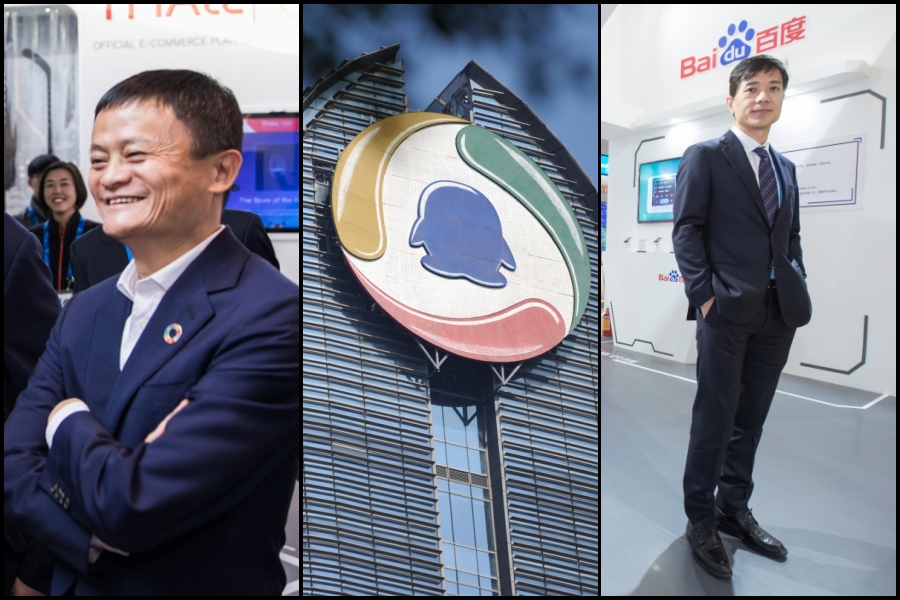In China, three tech titans have extended their business reach into almost every area of life. The dominance of Baidu, Alibaba and Tencent, known collectively as BAT, is impressive. Shares in the BAT trinity rocketed to a combined valuation of nearly US$1 trillion last year, while Alibaba and Tencent now together account for nearly a third of the MSCI China index. Over 60% of digital advertising spend in China goes to BAT, according to eMarketer.
China isn’t unique in facing a tech near-monopoly, but there are characteristics that make these companies’ dominance particularly challenging for ambitious entrepreneurs.
“You get a similar situation in the States—the difference is that BAT does everything,” says William Bean, managing director of Chinaccelerator and investment partner at venture capital fund SOSV. “In the US, large companies tend to specialise in one or two things, rather than trying to do absolutely everything themselves. With BAT they do every different service and category – everything from video to transportation to payments to banking.”
What about the startups?
Some are optimistic that the existence of BAT and their increasing willingness to invest in startups helps fuel China’s tech startup culture.
“BAT are getting more and more open to collaboration, and through collaboration they can see how these young companies are doing, and the companies become their acquisition and investment targets,” says Bessie Lee, founder of Withinlink and former CEO of WPP China. “In China, if you are a successful startup, you have many great capital market options. You can be acquired by BAT, acquired by a China-listed company, or you can list in China or list overseas.
“Startups in China probably have more options than ever and most are very optimistic about running and growing businesses in this market. They aren’t afraid of being eaten up by BAT.”
For others, though, the three giants create a situation where ambitious startups only have one realistic option—partnering with or being bought by BAT.

“It’s absolutely impossible,” says Shaun Rein, author of a new book called The War For China’s Wallet. “It’s a virtual monopoly that the government needs to step in and break up. If you’re in the tech world or even moving into other businesses, you have to be part of the Tencent or Alibaba ecosystem. They’re spreading their money everywhere as investors.
“When you talk to entrepreneurs now, they often don’t have the dream of IPO-ing, they have the dream of being bought up by one of these players.”
However, startups do continue to flourish in China. In 2014, the country had eight unicorns—companies less than 10 years old and valued at US$1 billion or more—now, it has 56, according to a new report released by Chinese startup database, IT Juzi. There were 34 new unicorn companies in 2017 alone; to compare, Europe had just 23. Most of China’s new class of unicorn businesses are in the ecommerce and online marketplace industries, bringing them frequently into conflict with BAT.
“Consumer-facing startups are particularly hard, because of BAT,” says Victor Lee, associate director at Airwave Mobile, Omnicom Media Group. “But there are so many opportunities around non-consumer facing stuff that nobody is talking about because they’re not as sexy—for example, financial solutions, and solving algorithmic problems related to smaller niche industries. There are a lot of startups that are well-funded and on their way to becoming unicorns in these specific industries. They just need to find their own niche not served by BAT.”
Success stories
Pinduoduo is one of the largest consumer-facing companies to have broken through the BAT ceiling, although it should be noted that it does have backing from Tencent. The app is a social commerce site that lets users earn group discounts when they pool purchases. Choosing a category brings up a list of products and deals that users can share—the more people taking up the deal, the lower the price falls.
Started by ex-Google engineer Colin Huang, the social commerce site recently raised more than US$100 million, according to Bloomberg, valuing the company at over US$1.5 billion less than two years after founding.
“Pinduoduo solves a problem, they’re a very good cultural fit, they have a pretty good model that people seem to like—social commerce is an area that we’ve been investing heavily in for the last three years,” says Chinaccelerator’s Bean.

Pinduoduo is now the largest private ecommerce company in China by sales volume. It had 114 million monthly active users in December 2017, overtaking Tmall’s 80 million but still far smaller than Taobao’s 532 million, according to data provider Jiguang.cn.
“I think Pinduoduo’s group-buy idea has succeeded this time because of the social community; I’m doing a group buy with friends I know, rather than strangers I’ve never met,” says Bessie Lee. “In China all logistics and ecommerce industries are very mature, thanks to Alibaba and JD. So with any such business you don’t have to worry about the back-end logistics—what you need to think of is whether you can put something in front of the consumer that is unique, or capture a gap in the market.”
Another star in China’s startup scene is Toutiao, a news app that selects news, online books, videos and other content for readers. The site has evolved from a pure news aggregation app to a content creation site, allowing users to contribute news as well as consume it.
“Toutiao suddenly had more users they had to take care of, and that meant they needed more content,” says Bessie Lee. “So they opened up the platform to anyone who is a content creator, and the content variety expanded almost unlimitedly. Because relevant content is being put in front of each consumer, the advertising is also very targeted. As a user, I will only see advertising relevant to content I’ve picked.”
Toutiao was founded by Zhang Yiming in 2012 and is one of the fastest-growing tech groups in China. Its valuation has leapt forty-fold in three years—worth US$500 million in 2014, Reuters reports that it is now worth over US$20 billion.
“Sometimes you get a company that gets ‘escape velocity’, and one example is Toutiao,” says Bean. “It got a lot of users very quickly, and they were able to break through the glass ceiling and escape out to become a leading company.”
BAT bites back
However, Toutiao has already rubbed up against China’s incumbents. Tencent filed a lawsuit last April over copyright violations, and this was ultimately deemed successful despite a counter-claim made by Toutiao’s owner. The company has also faced scrutiny from Chinese regulators, including a 24-hour ban for allowing pornographic content through, prompting the hiring of thousands of in-house editors.
A third startup with momentum is Douyu, a Tencent-backed live-streaming game platform that topped Deloitte’s 2017 list of the 500 fastest-growing technology companies in Asia Pacific. It competes with the likes of Panda TV, a live-streaming game site backed by Wang Sicong, the son of China’s second-richest tycoon.

Douyu built its business around gamers broadcasting their online matches and sharing strategies with fellow gamers, before expanding to other live-streaming content such as cooking lessons, cosmetic tips and outdoor sports. Wuhan Douyu Network Technology, Douyu’s operator, has seen its revenue surge 707 times over the past three years, says Deloitte.
Live-broadcasting has become a hot sector in China, with iResearch finding nearly 400 million people regularly watching live broadcasts via mobile devices. This area is likely to be of growing interest to brands and advertisers; corporations will spend US$325 million on sponsorships and marketing related to the e-sports market this year, predicts intelligence firm Newzoo, a 49% jump year-on-year.
While a few companies have found their own market niche, BAT dominance will make it difficult for startups to grow big enough to threaten their tech monopoly.
“China is a good place to start a company, but you have to be willing to work with one of these companies,” concludes Rein. “It’s a double-edged sword.”








